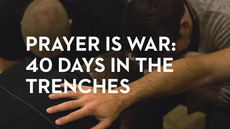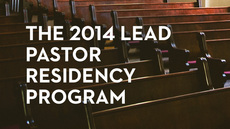Who is James?
As a derivative of the Old Testament name Jacob, James is an incredibly popular name in the New Testament appearing 40–60 times in reference to 5–8 different men, depending on which scholar you prefer.
The most famous and controversial of these men is purported to be Jesus’ brother. On this point, debate ensues with three basic lines of thinking:
- James is a son of Jesus’ adoptive father, Joseph, from a marriage prior to Mary, which would make James Jesus’ older stepbrother. There is zero evidence for this view in Scripture, and it is speculative at best.
- The words used in the Bible for “brothers” and “sisters” have a broad meaning and refer not to Jesus’ immediate family but rather extended family members such as cousins. This is possible, but it is not the plainest reading of the Scriptures, and it is a reading often motivated by the desire to present Mary as not just a virgin prior to marriage but a virgin throughout the totality of her life.
- James is Jesus' younger half brother, born naturally to Mary and Joseph. This is the most probable view and results from the plainest reading of Scripture.
As a general rule, Catholics prefer views one and two and Protestants prefer view three. I was raised Catholic, baptized as a baby, and served as an altar boy while attending Catholic grade school for a few years and was told that Mary remained a virgin through the entirety of her life and was therefore incapable of bearing children other than Jesus.
Arguments for the perpetual virginity of Mary arose as early as the second century, became more popular in the fourth century, and culminated with the Second Council of Constantinople, which convened in 553 and declared Mary “ever virgin.” Some early church fathers (such as Origen), some Catholic and Protestant theologians (such as Luther, Calvin, Zwingli, and Wesley), along with the Second Helvetic Confession and the Geneva Bible also say that Mary was semper virgo (“ever virgin”).
There are many Catholics who are born again, Jesus-loving Christians, but I was not one of them. I did not become a Christian with a true repentance of my sin and faith in Jesus Christ until I was a freshman in college. At that time, as I started reading the Bible for myself, I was surprised to read about Jesus’ brothers and sisters. The following are the places in the New Testament that speak of Jesus’ family. As I begin preaching through James, I offer them to help provide a context for who James is as Jesus’ little brother for those who are interested to examine this important issue for themselves:
Jesus had brothers
Matthew 12:46–50: “While he was still speaking to the people, behold, his mother and his brothers stood outside, asking to speak to him. But he replied to the man who told him, ‘Who is my mother, and who are my brothers?’ And stretching out his hand toward his disciples, he said, ‘Here are my mother and my brothers! For whoever does the will of my Father in heaven is my brother and sister and mother.’”
Jesus’ mother, brothers, and sisters disbelieved his claims at first
Matthew 13:53–57: “And when Jesus had finished these parables, he went away from there, and coming to his hometown he taught them in their synagogue, so that they were astonished, and said, ‘Where did this man get this wisdom and these mighty works? Is not this the carpenter’s son? Is not his mother called Mary? And are not his brothers James and Joseph and Simon and Judas? And are not all his sisters with us? Where then did this man get all these things?’ And they took offense at him. But Jesus said to them, ‘A prophet is not without honor except in his hometown and in his own household.’”
Jesus’ mother and brothers feared he had lost touch with reality
Mark 3:21, 31–35: “And when his family heard it, they went out to seize him, for they were saying, ‘He is out of his mind.’”
“. . . And his mother and his brothers came, and standing outside they sent to him and called him. And a crowd was sitting around him, and they said to him, ‘Your mother and your brothers are outside, seeking you.’ And he answered them, ‘Who are my mother and my brothers?’ And looking about at those who sat around him, he said, ‘Here are my mother and my brothers! For whoever does the will of God, he is my brother and sister and mother.’”
Jesus had at least three brothers and more than one sister
Mark 6:1–6: “He went away from there and came to his hometown, and his disciples followed him. And on the Sabbath he began to teach in the synagogue, and many who heard him were astonished, saying, ‘Where did this man get these things? What is the wisdom given to him? How are such mighty works done by his hands? Is not this the carpenter, the son of Mary and brother of James and Joses and Judas and Simon? And are not his sisters here with us?’ And they took offense at him. And Jesus said to them, ‘A prophet is not without honor, except in his hometown and among his relatives and in his own household.’ And he could do no mighty work there, except that he laid his hands on a few sick people and healed them. And he marveled because of their unbelief. And he went about among the villages teaching.”
Luke 8:19–21: “Then his mother and his brothers came to him, but they could not reach him because of the crowd. And he was told, ‘Your mother and your brothers are standing outside, desiring to see you.’ But he answered them, ‘My mother and my brothers are those who hear the word of God and do it.’”
Jesus’ mother had some idea of his miraculous power early in his ministry
John 2:1–12: “On the third day there was a wedding at Cana in Galilee, and the mother of Jesus was there. Jesus also was invited to the wedding with his disciples. When the wine ran out, the mother of Jesus said to him, ‘They have no wine.’ And Jesus said to her, ‘Woman, what does this have to do with me? My hour has not yet come.’ His mother said to the servants, ‘Do whatever he tells you.’
“Now there were six stone water jars there for the Jewish rites of purification, each holding twenty or thirty gallons. Jesus said to the servants, ‘Fill the jars with water.’ And they filled them up to the brim. And he said to them, ‘Now draw some out and take it to the master of the feast.’ So they took it. When the master of the feast tasted the water now become wine, and did not know where it came from (though the servants who had drawn the water knew), the master of the feast called the bridegroom and said to him, ‘Everyone serves the good wine first, and when people have drunk freely, then the poor wine. But you have kept the good wine until now.’ This, the first of his signs, Jesus did at Cana in Galilee, and manifested his glory. And his disciples believed in him.
“After this he went down to Capernaum, with his mother and his brothers and his disciples, and they stayed there for a few days.”
Jesus’ brothers struggled to understand him
John 7:2–5: “Now the Jews’ Feast of Booths was at hand. So his brothers said to him, ‘Leave here and go to Judea, that your disciples also may see the works you are doing. For no one works in secret if he seeks to be known openly. If you do these things, show yourself to the world.’ For not even his brothers believed in him.”
After Jesus rose from death, his family worshiped him as God
Acts 1:14: “All these with one accord were devoting themselves to prayer, together with the women and Mary the mother of Jesus, and his brothers.”
The early church saw James as an authority to report to
Acts 12:16–17: “But Peter continued knocking, and when they opened, they saw him and were amazed. But motioning to them with his hand to be silent, he described to them how the Lord had brought him out of the prison. And he said, ‘Tell these things to James and to the brothers.’ Then he departed and went to another place.”
James helped lead an early church council and spoke with authority
Acts 15:12–21: “And all the assembly fell silent, and they listened to Barnabas and Paul as they related what signs and wonders God had done through them among the Gentiles. After they finished speaking, James replied, ‘Brothers, listen to me. Simeon has related how God first visited the Gentiles, to take from them a people for his name. And with this the words of the prophets agree, just as it is written,
‘“After this I will return, and I will rebuild the tent of David that has fallen; I will rebuild its ruins, and I will restore it, that the remnant of mankind may seek the Lord, and all the Gentiles who are called by my name, says the Lord, who makes these things known from of old.”
Therefore my judgment is that we should not trouble those of the Gentiles who turn to God, but should write to them to abstain from the things polluted by idols, and from sexual immorality, and from what has been strangled, and from blood. For from ancient generations Moses has had in every city those who proclaim him, for he is read every Sabbath in the synagogues.’”
Various leaders, including Paul, traveled to meet with James
Acts 21:17–20: “When we had come to Jerusalem, the brothers received us gladly. On the following day Paul went in with us to James, and all the elders were present. After greeting them, he related one by one the things that God had done among the Gentiles through his ministry. And when they heard it, they glorified God.”
James was married
1 Corinthians 9:5: “Do we not have the right to take along a believing wife, as do the other apostles and the brothers of the Lord and Cephas?”
Jesus appeared to James after his resurrection
1 Corinthians 15:7: “Then he appeared to James, then to all the apostles.”
James was likely considered a peer to the Apostles
Galatians 1:18–19: “Then after three years I went up to Jerusalem to visit Cephas and remained with him fifteen days. But I saw none of the other apostles except James the Lord’s brother.”
James was among the most senior leaders in the early church
Galatians 2:7–9: “When they saw that I had been entrusted with the gospel to the uncircumcised, just as Peter had been entrusted with the gospel to the circumcised (for he who worked through Peter for his apostolic ministry to the circumcised worked also through me for mine to the Gentiles), and when James and Cephas and John, who seemed to be pillars, perceived the grace that was given to me, they gave the right hand of fellowship to Barnabas and me, that we should go to the Gentiles.”
James considered himself a slave to his brother
James 1:1: “James, a servant of God and of the Lord Jesus Christ, to the twelve tribes in the Dispersion: Greetings.”
James and his brother Jude were powerful pastors
Jude 1: “Jude, a servant of Jesus Christ and brother of James.”
In the book of Galatians, Paul calls James “pillar.” Outside of Scripture, from sources such as Hegesippus and Eusebius, it is reported that James had two other nicknames: “James the just,” because he was so righteous, and “camel knees” because he prayed so much.
Lastly, it is reported that James was martyred by being thrown off the pinnacle of the temple, but did not die and was therefore stoned and clubbed to death. His brother Simeon stepped up as his ministry successor. If this extra-biblical history is accurate, along with the Scriptures, the picture of James is a godly and fearless man who died without ever recanting the belief that his big brother was God. Indeed, James was Jesus’ bold little brother.
We began our new sermon series in the book of James this past Sunday. Join us at one of our local churches or follow along online, and be sure to check out the James Study Guide.















